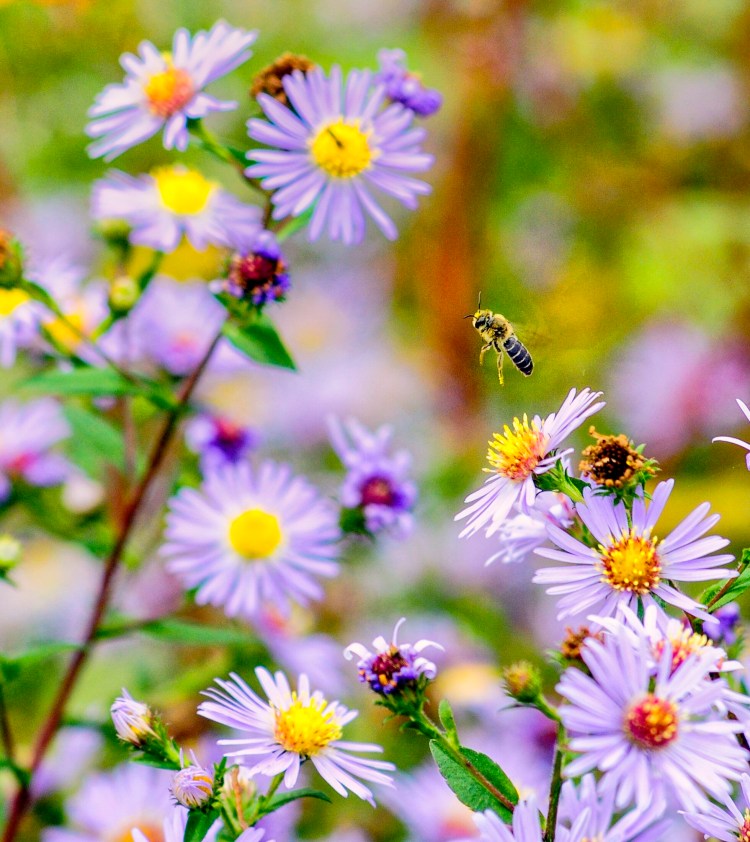As June ended, I was prepared for the summer of 2021 to once again be day after day of dealing with drought.
In May and June, the temperatures had been high and the rain infrequent. We’d actually bought a new sprinkler, as I was sick of hauling an old metal trash can around the yard for watering, placing the trash can upside down, then setting the sprinkler atop it so that each sprinkler sweep would cover more garden. The new one holds the sprinkler head up to four feet off the ground, no trash can necessary.
As it happens, I used the new sprinkler exactly once. Then the rains came, at least along the coast where we live. I have heard from inland friends and readers that most of the rain never made it inland. But I haven’t needed to use a sprinkler – just watering cans with rain-barrel water – since June.
The weather was strange, and the plants in our neighborhood acted a bit strangely, too, perhaps also in response to the unusually warm fall. Shrubs and perennials that typically bloom in the spring, and did so beautifully this year, produced another smaller round of blossoms in late September and early October. In our yard, that included several viburnum species and at least one iris.
What is going on? I emailed YongJiang Zhang, an assistant professor of plant physiology at the University of Maine, to ask. Fall blooms on spring-blooming plants – including wild blueberries – are becoming more common, he replied. “We don’t have a conclusion yet, but we are thinking it is related to some unpredicted warm spells in the fall. Some plants may get confused.”
In an experiment conducted by the university, some wild blueberry bushes were warmed artificially, he said, and they bloomed in the fall for a second time.
Our vegetable garden mostly liked the weather. We started harvesting lettuce – planted in the cold frame – in April, and had asparagus in early May, well before May 15, our typical date. Peas, both the shelling and pod varieties, were done by mid-July.
The tomato crop was strange. We got some Patio Delight tomatoes, about the size of tennis balls, in early July, which were, as the name implies, delightful. Later in July, we harvested red cherry tomatoes, which we’d bought as seedlings from the Portland Arts and Technology School plant sale; and Sun Gold cherry tomatoes, which we’d purchased from a local grower. We got a lot of both.
Full-sized slicing tomatoes, for some reason, didn’t do well. We harvested about eight of them in total. It wasn’t just me, either. A friend said he normally makes gallons of sauce from his full-sized tomatoes, but he got the same meager crop that we did. Maybe the tomatoes were confused by the weather, too.
Cucumbers and summer squash were bountiful, as were most of our other vegetables, such as carrots, onions, garlic and potatoes. We produced more butternut squash than we ever have before, but the chipmunks – who have taken over our yard – nibbled on so many of them that we’ve only got eight or so in sound enough condition to store for the winter. Fortunately, that’s about all we will eat, anyway.

Sure, they’re the picture of adorable innocence, but did wily raccoons eat all the peaches from Maine Gardener Tom Atwell’s tree? Jeremy Langlet/Shutterstock
Our apple tree produced a lot of apples, but the wildlife got most of them. They turned out to be russets. With brownish skin, it’s not a beautiful fruit, but the three I picked and tasted were quite good. Our peach tree also produced well, but though we covered it with a net, all the peaches disappeared in a single night, before they were even ripe. I’m blaming raccoons, but I have no proof.
The flower gardens have been a delight all year long, from the bulbs that blossomed prolifically in April to the asters that were still gorgeous in the middle of October. And as I write this, the temperatures have remained warm.
Hydrangea blossoms, too, have been big and bountiful. The arborescens and paniculata varieties that are reliable bloomers did even better than normal. The surprise was that the ‘Endless Summer’ macrophylla varieties, which are often disappointing in Maine gardens, produced better than I have ever seen them.
So, overall, the garden did its job this season, despite the tricky weather. It gave us food, flowers and, most importantly, entertainment.
Tom Atwell is a freelance writer gardening in Cape Elizabeth. He can be contacted at: tomatwell@me.com.
Send questions/comments to the editors.



Success. Please wait for the page to reload. If the page does not reload within 5 seconds, please refresh the page.
Enter your email and password to access comments.
Hi, to comment on stories you must . This profile is in addition to your subscription and website login.
Already have a commenting profile? .
Invalid username/password.
Please check your email to confirm and complete your registration.
Only subscribers are eligible to post comments. Please subscribe or login first for digital access. Here’s why.
Use the form below to reset your password. When you've submitted your account email, we will send an email with a reset code.